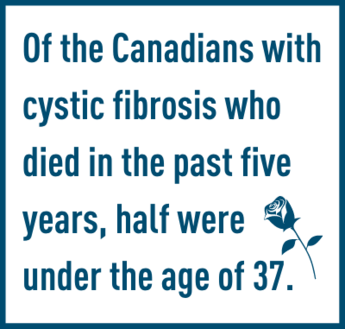Dr. Amanda Morris, a research fellow at the Hospital for Sick Children, has recently been awarded a research fellowship from Cystic Fibrosis Canada for her study, In vivo exploration of Pseudomonas aeruginosa and Staphylococcus aureus Interactions within Sputum of Cystic Fibrosis patients with Pulmonary Exacerbations.
Dr. Morris was awarded the Fusion Gala Research Fellowship Award, which goes to a promising young Canadian researcher who does not yet have their own lab. The funding was raised by the Fusion Gala to support one year of a two-year research fellowship awarded through the 2021 competition. In fact, the Fusion Gala was so successful, they provided enough funding to fund both years of Dr. Morris’s award!
"It is a tremendous honour to be able to directly fund this research fellowship in support of Dr. Morris's exciting research. We are so very thankful to our generous corporate sponsors, private donors and guests who together have helped raise more than $3.9 million for Cystic Fibrosis Canada since our gala began," said Co-Chair Nancy Griffin on behalf of the Fusion Gala committee.
The bacteria Pseudomonas aeruginosa and Staphylococcus aureus commonly cause infections in people who live with cystic fibrosis. Dr. Morris’s study will explore the interactions of these two bacteria to understand whether they are helping each other become more resistant to antibiotics. Understanding their interactions will inform more effective treatments for patients. One of the CF Canada community health priorities is to “predict and prevent pulmonary exacerbations” and another is to “eradicate chronic Pseudomonas aeruginosa infections.” Dr. Morris’s work is relevant to both of these priorities.
Below, Dr. Morris discusses her research study and her involvement with Cystic Fibrosis Canada.
Your Cystic Fibrosis Canada-funded research is on two bacteria known as Pseudomonas aeruginosa and Staphylococcus aureus. What are these infections, and what makes it so difficult to get rid of them?
CF patients have mucus in their lungs, which is a very conducive environment for these pathogens to grow. When cystic fibrosis patients get extremely sick and even end up dying, it is often due to Pseudomonas aeruginosa or Staphylococcus aureus infections in the sputum of their lungs. Staphylococcus aureus infections are usually present in younger CF patients, but at some point, in the teenage years, the dominant infection transitions to Pseudomonas aeruginosa. So, looking at how these species interact can give us an understanding of why certain antibiotics fail.
I am specifically looking at patients who experience pulmonary exacerbations, who are often very sick, to resolve the question: Are these polymicrobial interactions leading to more difficult-to-treat infections? This is unknown in published literature.
How do you think that studying these infections will help predict and prevent pulmonary exacerbations?
Nobody has extensively looked at studying germs within sputum. People have looked at interactions in many ways, but my literature review indicated that studies within the body are extremely limited and are mostly done in mouse models. Most studies that are done in vitro, meaning in the lab, attempt to mimic what is happening in the lungs, but you can’t get a full understanding without looking directly at it. This work will explore an area that has been unmet thus far as we investigate how these bacteria interact and how they lead to antimicrobial resistance.
What are the next steps in your research?
We are starting to enroll patients in our studies from St. Michael’s Hospital and the Hospital for Sick Children in Toronto. Right now, we are collecting sputum from the clinic at different time points during a pulmonary exacerbation to determine if we see any trends in the images at these time points.
Congratulations on receiving the Fusion Gala Research Fellowship Award, which provides funding to a promising Canadian scientist who is doing innovative CF research. What is the significance of this award to you and your study?
I really appreciate this award from Cystic Fibrosis Canada, and I am beyond happy that my idea can be further investigated with this funding. I am honoured that I can be seen as a promising researcher in this field, and I can pursue this study to help the community as much as I can. I really want to use this award to make a difference and go a step further in treating people with cystic fibrosis.
What do you see changing over the next five to 10 years for those with cystic fibrosis?
A lot of new and amazing studies and treatments are being released right now. CFTR modulator therapies significantly reduce the amount of sputum buildup, so fewer patients are developing pulmonary exacerbations. CF research is heading in the direction of treating patients with very severe symptoms, as CFTR modulator therapies are doing an excellent job at reducing exacerbation rates. Fewer patients are experiencing pseudomonal infections because they just are not producing enough of the sputum in which the infections reside. So, the shift will be to treating chronic cases in which CFTR modulator therapies might not be successful.
The 2022 Fusion Gala will be held on Saturday, October 22nd at the Angus Glen Golf Club in Unionville, Ontario. If you’re in the area, please join us for an evening of dining, dancing and fundraising. Find more information at www.fusiongala.ca.


.png)
.png)

